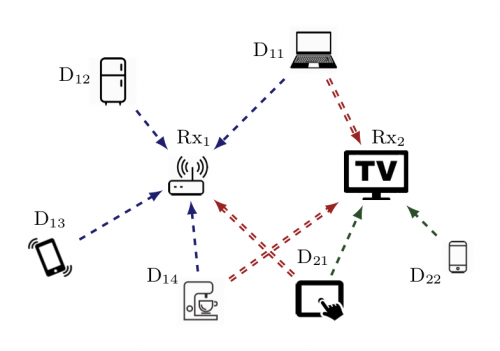ELIOT – “Enabling technoLogies for IOT” is a 5-year international collaborative project co-funded by the French National Agency of Research (ANR) and the Brazilian São Paulo Research Foundation (FAPESP).
Dates: Apr. 2019-Oct. 2024
Partners: ETIS/ENSEA, France; USP and PUC-Rio, Brazil
Team: 10 permanent researchers, 1 research eng., 8 PhD students, 4 Post-docs, 1 MSc student

Communication networks of interconnected devices lie at the core of many key future technologies such as distributed control systems for autonomous vehicles, sensor networks for structural health monitoring and for smart cities. In addition to reliability, all these applications come with strict requirements in terms of: energy efficiency, security, latency and self-optimization capabilities, and demand for innovative enabling technologies. The emerging Internet of Things (IoT) paradigm, projected to connect billions of wireless “things” (wireless sensors, wearables, biochip transponders, etc.) in a vast network with drastically different characteristics among its components, has moved from being a futuristic vision to an increasing reality over the recent years. The ELIOT project is perfectly timed to address the main challenges above. Specifically, the project is focused on the following key objectives to IoT applications:
- Energy efficient transceiver design and allocation policies: development of advanced low-energy transmit and receive techniques, including channel estimation for transceivers with coarse quantization (1-3 bits), and to exploit energy harvesting capabilities to mitigate interference and increase the device’s lifespan;
- Long-term security solutions: design of novel cross-layer security protocols based on software defined networking and physical layer security, avoiding the incremental application of existing security technologies;
- Distributed learning, detection and resource allocation / management: development of new distributed and efficient algorithms tailored to the IoT environment and underlying network infrastructure that take into account the device mobility, their limited energy and computational power;
- Improving the energy efficiency vs. latency tradeoff by channel coding: short-length error-correction coding schemes together with their derivatives and decoding algorithms will be designed for low-energy and low-latency IoT applications.
Tackling these objectives require a wide interdisciplinary palette of expertise ranging from signal process- ing, wireless communications, information theory and coding, security and cryptography, distributed and online optimization, game theory and learning. The diverse and complementary expertise of the project’s team places ELIOT in an ideal position to decisively contribute to the expansion of future generations of IoT ecosystems.
